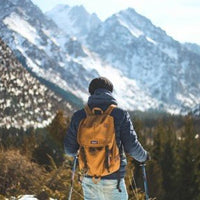Hiking is an exhilarating outdoor activity that allows us to connect with nature, challenge ourselves, and experience breathtaking landscapes. However, many people forget that hiking also involves constant exposure to natural elements and intense physical activity, both of which can lead to health issues such as dehydration. Dehydration occurs when the body loses more fluids than it takes in, leading to a deficiency of water necessary for vital bodily functions. Whether due to ill preparation or a lack of awareness, dehydration is pretty common amongst hikers and, if not addressed quickly, can lead to debilitating health conditions.
Therefore, when gathering basic equipment, such as ultralight hiking gear, you should also ensure an adequate supply of water that is easily accessible at all times. In this power blog, we will explore the reasons why dehydration is a hiker's worst enemy, understand its impact on the body, and discuss essential strategies to prevent and manage it.
Understanding Dehydration
Dehydration is a physiological condition that occurs when the body loses more fluids than it takes in, disrupting the delicate balance of water required for proper bodily functions. For hikers, understanding dehydration is paramount as it poses a serious threat to their well-being during outdoor adventures.
Hydration is the foundation of optimal bodily function. Water plays a crucial role in digestion, nutrient transportation, temperature regulation, and joint lubrication. During hiking, the body expends significant energy and loses fluids through sweating, therefore, there is a need to stay hydrated more than usual. Hikers need to carry an adequate supply of water with them at all times to ensure their physical condition is optimal.
Recognizing The Signs of Dehydration
Recognizing the early signs of dehydration is vital for hikers to intervene promptly and avoid potentially dangerous situations. The first indication is a dry and sticky mouth, often accompanied by feelings of thirst. As dehydration progresses, hikers may experience fatigue, dizziness, and darker-colored urine, indicating a need for more water intake. Furthermore, dehydration can lead to headaches, muscle cramps, and dry skin. Being vigilant about these symptoms enables hikers to take immediate action, such as resting, finding shade, and hydrating adequately to prevent further complications and ensure a safe and enjoyable hiking experience.
Impacts of Dehydration on Hikers
Dehydration can impact hikers in a multitude of ways, apart from the obvious physical symptoms. These impacts can not only get in the way of a hiker's enjoyment, but they can also be long-term, significantly affecting the quality of life of the impacted individuals. Therefore, it is important to know in what ways dehydration can affect hikers. Here are the major impacts of dehydration on hikers:
1. Impact on Physical Performance
Dehydration profoundly affects a hiker's physical performance. As the body loses water, blood volume decreases, impairing oxygen transport to muscles. This leads to reduced strength, endurance, and coordination, making even simple hiking trails arduous and risky. Dehydrated hikers are more prone to stumbling, falling, and getting lost. This can even become life-threatening if the hiking terrain does not allow for any missteps.
2. Cognitive Impairment
Aside from physical limitations, dehydration also impacts cognitive function. Studies have shown that even mild dehydration can lead to decreased concentration, memory lapses, and impaired decision-making skills. In the wilderness, making wrong judgments due to dehydration can lead to potentially life-threatening situations.
3. Increased Risk of Heat-Related Illnesses
Hiking often takes place in warm and sunny environments, increasing the risk of heat-related illnesses. Dehydration hampers the body's ability to regulate temperature through sweating, leading to heat exhaustion and heatstroke. These conditions are serious medical emergencies that require immediate attention.
4. Inadequate Hydration of Cells and Organs
Beyond its impact on performance, dehydration also affects the hydration of cells and organs. Prolonged dehydration can strain the kidneys, impair liver function, and increase the risk of urinary tract infections. Additionally, it can cause headaches, muscle cramps, and dry skin, leading to an uncomfortable hiking experience.
How to Prevent Dehydration During Hikes
Dehydration is a pretty common issue on the trail, and all hikers can take plenty of preventative measures to ensure their journey is safe. Here are a few ways to prevent dehydration during hikes:
1. Pre-emptive Hydration
Preparation is key to preventing dehydration during hiking. Hikers should ensure they are well-hydrated before embarking on their journey. Drinking water or electrolyte-rich fluids in the hours leading up to the hike helps kickstart the body's hydration process.
2. Carry Sufficient Water
One of the biggest reasons hikers are dehydrated on the trail is a failure to carry sufficient water. Most hikers feel as if lugging huge bottles of water with them will be useless. This can be true; however, the correct amount of water to carry on a hike depends on the intensity and duration of the hike. A general rule of thumb is to consume at least one liter of water every two hours while hiking.
3. Electrolytes and Hydration Supplements
In addition to water, replenish essential electrolytes lost through sweating by consuming sports drinks or hydration supplements. Electrolytes, such as sodium, potassium, and magnesium, play a crucial role in maintaining fluid balance in your body, helping you stay properly hydrated throughout your hike.
4. Snack Wisely
Choose snacks that have a high water content to complement your hydration efforts. Fruits like watermelon, oranges, and cucumbers are excellent choices as they not only provide hydration but also offer essential vitamins and minerals to keep you energized on the trail. Cutting them beforehand and keeping them in sealed plastic bags is a great idea and gives you plenty of sustenance throughout your hike.
5. Pace Yourself
Avoid overexertion during your hike, as excessive physical activity can lead to increased sweating and dehydration. Pace yourself according to the trail's difficulty, take breaks when necessary, and listen to your body's signals.
6. Dress Appropriately
Wear lightweight, breathable clothing that allows sweat to evaporate, helping to regulate your body temperature. Proper attire can reduce excessive sweating and water loss, promoting better hydration during your hike.
7. Avoid Caffeine
While the idea of sipping on your favorite caffeinated beverage while enjoying nature sounds great, it can lead to dehydration pretty quickly. Caffeinated drinks such as coffee, soda, or energy drinks are diuretics, i.e. they cause a person to urinate. This frequent urination brought about by caffeine is not only inconvenient, but it can also lead to dehydration due to frequent loss of water. Therefore, it is best to avoid any caffeine on the trail.
Managing Dehydration on The Trail
Even when you've taken preventative measures, due to unforeseen issues, you can face dehydration during a hike. In such a scenario, it is important to know what to do to manage your condition and ensure that it is not exacerbated. Here are a few ways you can manage dehydration while on the trail:
1. Recognizing Early Signs
Dehydration is best resolved by nipping it in the bud. It is essential to know the early signs of dehydration so you can get adequate hydration as soon as possible and avoid any major health issues. If symptoms like dry mouth, fatigue, or darker urine are observed, it's essential to take a break, find shade, and hydrate immediately.
2. Utilizing Natural Water Resources
If you run out of water on the trail, there are natural water sources that you can use to replenish yourself. When hiking in areas with natural water sources, such as streams or springs, it's crucial to carry a water filter or purification tablets. Refilling water bottles from these sources can help extend the available water supply and save you from acute dehydration.
3. Scheduling Breaks
Hikers should plan regular breaks during their journey to rest, rehydrate, and assess their physical and mental condition. These breaks allow the body to recover and help avoid severe dehydration.
4. Stay Cool
In hot weather, take extra precautions to stay cool and prevent dehydration. Seek shade whenever possible, especially during breaks. Use a wide-brimmed hat and sunglasses to protect yourself from direct sunlight, and consider wetting your clothing or using a cooling towel to help maintain a comfortable body temperature.
Final Thoughts
Dehydration is a formidable adversary for hikers, posing risks to both physical performance and overall well-being. Understanding the importance of hydration, recognizing the signs of dehydration, and implementing preventive measures are vital to ensure a safe and enjoyable hiking experience. By treating hydration as a top priority, hikers can conquer the trails with confidence, immersing themselves in the beauty of nature while staying vigilant against dehydration's lurking threat.
To avoid dehydration, you first and foremost need a well-designed hiking backpack that can hold all your water without weighing you down. Light Hiking Gear's range of ultralight hiking gear also includes comfortable hiking backpacks that are spacious enough to hold your water supply and also feel light as a feather. Explore our site today to browse through our thoughtfully curated selection of ultralight hiking packs and other backpacking gear to last you a lifetime.









0 comments